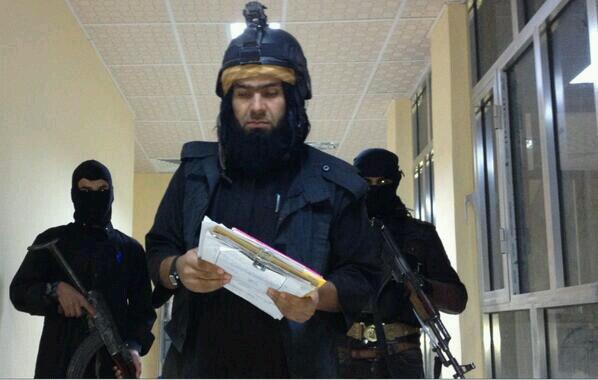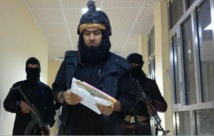It is the first time militants have exercised such open control in major cities since the height of the insurgency that followed the 2003 US-led invasion.
"Oh Sunni people, you were forced to take up the weapon," Abu Mohammed al-Adnani, spokesman for Al-Qaeda-linked group the Islamic State of Iraq and the Levant (ISIL), said in an audio recording released Tuesday.
"Do not lay the weapon down, because if you put it down this time, the (Shiites) will enslave you and you will not rise again," he urged Iraqi Sunnis, referring to the Shiite-led government in Baghdad.
Earlier, defence ministry spokesman Staff Lieutenant General Mohammed al-Askari said soldiers deployed near Fallujah would hold off on assaulting the city for now.
"It is not possible to assault (Fallujah) now" over concerns about civilian casualties, Askari told AFP.
Attacking the Sunni-majority city would also be extremely politically sensitive, as it would inflame already high tensions between the Sunni Arab minority and the government.
And it would be a major test for Iraqi security forces, which have yet to undertake such an operation without the backing of American troops.
Overnight, security forces and allied tribesmen sought to retake south Ramadi from ISIL, but the assault failed after seven hours of fighting, a police captain said.
Four civilians were killed and 14 wounded, said Ramadi hospital's Dr Ahmed Abdul Salam, who had no casualty figures for security forces or militants.
Later Tuesday, missile strikes in Ramadi killed 25 militants, Askari said.
Meanwhile, the army deployed reinforcements including tanks to an area about 15 kilometres (10 miles) east of Fallujah, police told AFP.
Prime Minister Nuri al-Maliki has called on Fallujah residents and tribes to expel ISIL to stave off a military offensive.
But senior tribal leader Sheikh Ali al-Hammad told AFP Monday ISIL had left Fallujah, which was now held by tribesmen.
US 'working with Iraq'
As violence in Anbar entered its second week, the Pentagon said Washington would accelerate delivery of 100 Hellfire missiles, which were due to be sent to Iraq in the next few months.
Colonel Steven Warren said an additional 10 ScanEagle surveillance drones would also be supplied.
He said Washington was working with Iraq to develop a "holistic strategy to isolate Al Qaeda-affiliated groups so the tribes working with the security forces can drive them out of the populated areas".
Fighting erupted near Ramadi on December 30, when security forces cleared a year-old protest camp where Sunni Arabs had demonstrated against what they see as the marginalisation and targeting of their community by the government in Baghdad.
The violence spread to Fallujah, and militants moved in and seized the city after security forces withdrew.
Maliki had long sought the closure of the protest camp, dubbing it a "headquarters for the leadership of Al-Qaeda".
But its removal has come at the cost of a sharp decline in Anbar's security situation.
Both Ramadi and Fallujah were insurgent strongholds in the years after 2003, and Fallujah was the target of two major assaults in which US forces saw some of their heaviest fighting since the Vietnam War.
They eventually wrested back control of Anbar with the support of Sunni Arab tribesmen who formed the Sahwa (Awakening) militias, which allied with US troops against Al-Qaeda from late 2006.
But two years after US forces withdrew from Iraq, Sunni militants have regained strength, bolstered by the war in neighbouring Syria and widespread Sunni Arab anger with the federal government.
Anbar was not the only focus of violence on Tuesday.
In Baghdad, gunmen killed 12 people at a brothel, and seven police officers were shot dead at a checkpoint north of the capital.
In the northern city of Kirkuk, a suicide truck bomber targeted a police station, killing five people, among them two police, and three security forces members died in other attacks.
-------------------------------------------------------------------------------------
"Oh Sunni people, you were forced to take up the weapon," Abu Mohammed al-Adnani, spokesman for Al-Qaeda-linked group the Islamic State of Iraq and the Levant (ISIL), said in an audio recording released Tuesday.
"Do not lay the weapon down, because if you put it down this time, the (Shiites) will enslave you and you will not rise again," he urged Iraqi Sunnis, referring to the Shiite-led government in Baghdad.
Earlier, defence ministry spokesman Staff Lieutenant General Mohammed al-Askari said soldiers deployed near Fallujah would hold off on assaulting the city for now.
"It is not possible to assault (Fallujah) now" over concerns about civilian casualties, Askari told AFP.
Attacking the Sunni-majority city would also be extremely politically sensitive, as it would inflame already high tensions between the Sunni Arab minority and the government.
And it would be a major test for Iraqi security forces, which have yet to undertake such an operation without the backing of American troops.
Overnight, security forces and allied tribesmen sought to retake south Ramadi from ISIL, but the assault failed after seven hours of fighting, a police captain said.
Four civilians were killed and 14 wounded, said Ramadi hospital's Dr Ahmed Abdul Salam, who had no casualty figures for security forces or militants.
Later Tuesday, missile strikes in Ramadi killed 25 militants, Askari said.
Meanwhile, the army deployed reinforcements including tanks to an area about 15 kilometres (10 miles) east of Fallujah, police told AFP.
Prime Minister Nuri al-Maliki has called on Fallujah residents and tribes to expel ISIL to stave off a military offensive.
But senior tribal leader Sheikh Ali al-Hammad told AFP Monday ISIL had left Fallujah, which was now held by tribesmen.
US 'working with Iraq'
As violence in Anbar entered its second week, the Pentagon said Washington would accelerate delivery of 100 Hellfire missiles, which were due to be sent to Iraq in the next few months.
Colonel Steven Warren said an additional 10 ScanEagle surveillance drones would also be supplied.
He said Washington was working with Iraq to develop a "holistic strategy to isolate Al Qaeda-affiliated groups so the tribes working with the security forces can drive them out of the populated areas".
Fighting erupted near Ramadi on December 30, when security forces cleared a year-old protest camp where Sunni Arabs had demonstrated against what they see as the marginalisation and targeting of their community by the government in Baghdad.
The violence spread to Fallujah, and militants moved in and seized the city after security forces withdrew.
Maliki had long sought the closure of the protest camp, dubbing it a "headquarters for the leadership of Al-Qaeda".
But its removal has come at the cost of a sharp decline in Anbar's security situation.
Both Ramadi and Fallujah were insurgent strongholds in the years after 2003, and Fallujah was the target of two major assaults in which US forces saw some of their heaviest fighting since the Vietnam War.
They eventually wrested back control of Anbar with the support of Sunni Arab tribesmen who formed the Sahwa (Awakening) militias, which allied with US troops against Al-Qaeda from late 2006.
But two years after US forces withdrew from Iraq, Sunni militants have regained strength, bolstered by the war in neighbouring Syria and widespread Sunni Arab anger with the federal government.
Anbar was not the only focus of violence on Tuesday.
In Baghdad, gunmen killed 12 people at a brothel, and seven police officers were shot dead at a checkpoint north of the capital.
In the northern city of Kirkuk, a suicide truck bomber targeted a police station, killing five people, among them two police, and three security forces members died in other attacks.
-------------------------------------------------------------------------------------









 Home
Home Politics
Politics











